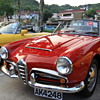Posted 10 years ago
 Chrisnp
Chrisnp
(310 items)
In 1910 the British began developing a replacement for the Short Magazine Lee Enfield (SMLE) rifle. When WWI broke out, the War Office decided to continue production of the SMLE in Britain, and contracted with Winchester and Remington in the US to manufacture the new rifle, the Pattern 14, in .303 British caliber. The contract was nearing completion when the US entered the war in 1917, and the US decided that it would be more efficient to contract for rifles the manufacturer was already tooled up for. With a few minor changes, the P-14’s twin brother, the US Model 1917 was born in .30-06 caliber.
As it would turn out, the P-14 would never replace the SMLE as the British main battle rifle. The M1917 was never intended to replace the ’03 Springfield, although due to manufacturing issues with the ‘03, more doughboys would carry the M1917 into battle during WWI than the Springfield. Both P-14 and M1917 remained alternate issue in their respective countries.
In 1941, the US shipped over 100,000 M1917s to Britain for service with their home guard. This created an interesting situation in that the British now had two outwardly identical rifles in different calibers. The remedy was to paint a red band around the stock of the M1917s. If you look closely, you’ll see that the band is also stenciled “30-06.” It appears that the top wood on my rifle was replaced some time afterward.
The receiver of my M1917 is marked “EDDYSTONE” indicating manufacture at Remington’s Eddystone Pennsylvania plant. Inside the stock compartment is an identical cleaning kit to the one I’ve shown with my 1903 Springfield last week. The sling is the Model 1917 web “Kerr Sling” made by the Kerr Adjustable Strap Company as a WWI alternative to the standard issue 1907 leather slings. Also pictured is a WWI period disposable bandoleer that would have been packed in the ammo containers.
Ammo: The .30-06 ammo used through WWI was a 150 grain spitzer with a velocity of 2700 fps. The ammo I use with my M1917 is a load I developed when I was shooting competitively with my M-1 Garand; a 168 grain Nosler Hollow Point Boat Tail Match bullet backed by 46 grains of IMR 4895. The typical course of fire back then was at 200, 300 and 500 yards. In my M-1, this load did very well. I’ve also used this load at 800 and 1,000 yards and I don’t recall any disappointment. These days my closest rifle range only goes to 100 yards, and there I get 3-4” groups with the M1917.
WARNING: Load data is provided for information only. Many vintage firearms are unsafe to shoot and I do not advise use of this load data for other firearms since I do not know the specific firearm that may be involved or its condition.


















Mo history I didn't know.
Love this piece. And the information. I have the Remington model 1917. Thanks for posting this great piece.
Thanks for the comments jimborasco and blunder.
Also, thanks for the love jimborasco, EJW-54, Guardian, officialfuel, fortapache, blunder and geo26e.
Thanks for the love Blackshiep1.